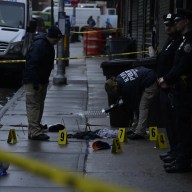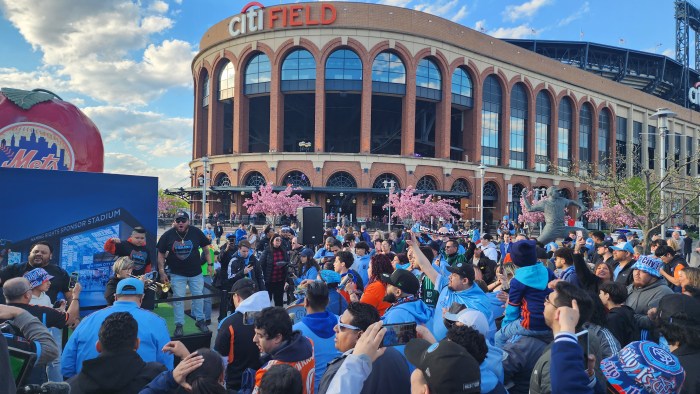Basdeo Panday, former prime minister who lost the office despite gaining the popular vote in a controversial election in the twin island nation in December, held court with reporters Friday evening at…
By Daniel Massey
They call him the Al Gore of Trinidad and Tobago.
Basdeo Panday, former prime minister who lost the office despite gaining the popular vote in a controversial election in the twin island nation in December, held court with reporters Friday evening at the Crowne Plaza Hotel in East Elmhurst
He was in town along with other representatives of the United National Congress to drum up support for a new election in Trinidad and Tobago, a republic of 1.2 million people northeast of Venezuela that is slightly smaller in size than Delaware.
The Friday news conference kicked off a weekend of activity for Panday and other UNC party leaders. On Saturday more than 300 people attended a benefit gala at Calypso City in Richmond Hill, the neighborhood that is home to many of the borough's Indo-Trinidadians.
“We are very much aware that the United States had a problem resolving its presidential election,” said Ashford Maharaj, spokesman for three local groups which sponsored Panday’s visit. “We had a similar situation in Trinidad and Tobago.”
The politics of Trinidad and Tobago have long been divided along racial lines, with people of Indian descent supporting the UNC and those of African descent backing the rival People’s National Movement. The two racial groups each represent about 40 percent of the nation’s population.
In December, voters cast ballots along racial lines for the 36 seats in the nation’s House of Representatives. The election resulted in an 18-18 tie between the UNC and the People’s National Movement.
“The history of Trinidad and Tobago has been the history of the politics of race because of our historical antecedents of slavery from Africa and indentured servitude from India,” said Panday.
With the stalemate at the ballot box in December, neither party could lay claim to the top post of prime minister.
Armed with 30,000 more popular votes, then Prime Minister Panday called for President Arthur Robinson of the PNM to return him to office, while former Prime Minister Patrick Manning of the PNM also sought the position.
Robinson chose his own party’s candidate, Manning, who is black. Since the decision, the nation’s parliament has not met.
“Here is a parliamentary democracy with no government,” said Panday, issuing a call for new elections. “Government runs the country with no responsibility to anyone.”
In an effort to apply pressure for a new election, Panday hoped to meet with local politicians, including U.S. Rep Gregory Meeks (D-St. Albans).
But the former prime minister conceded even new elections might not solve the political stalemate in Trinidad and Tobago.
“If patterns of racial voting continue, there will always be a deadlock,” said Panday, noting that some degree of power sharing will ultimately be necessary between the two political parties.
His visit followed one made by UNC Chief Whip Ganga Singh to Richmond Hill in May and was sponsored by the East Indian Diaspora, the Association for All Trinidadians & Tobagonians and the United National Congress of New York.
Reach reporter Daniel Massey by e-mail at Timesledger@aol.com or call 229-0300, Ext. 156.
































